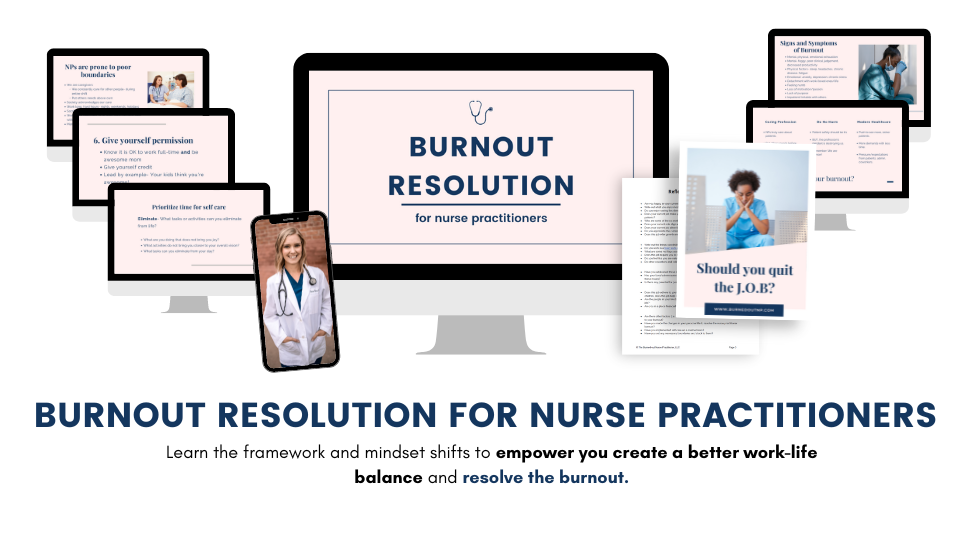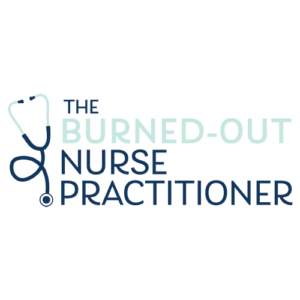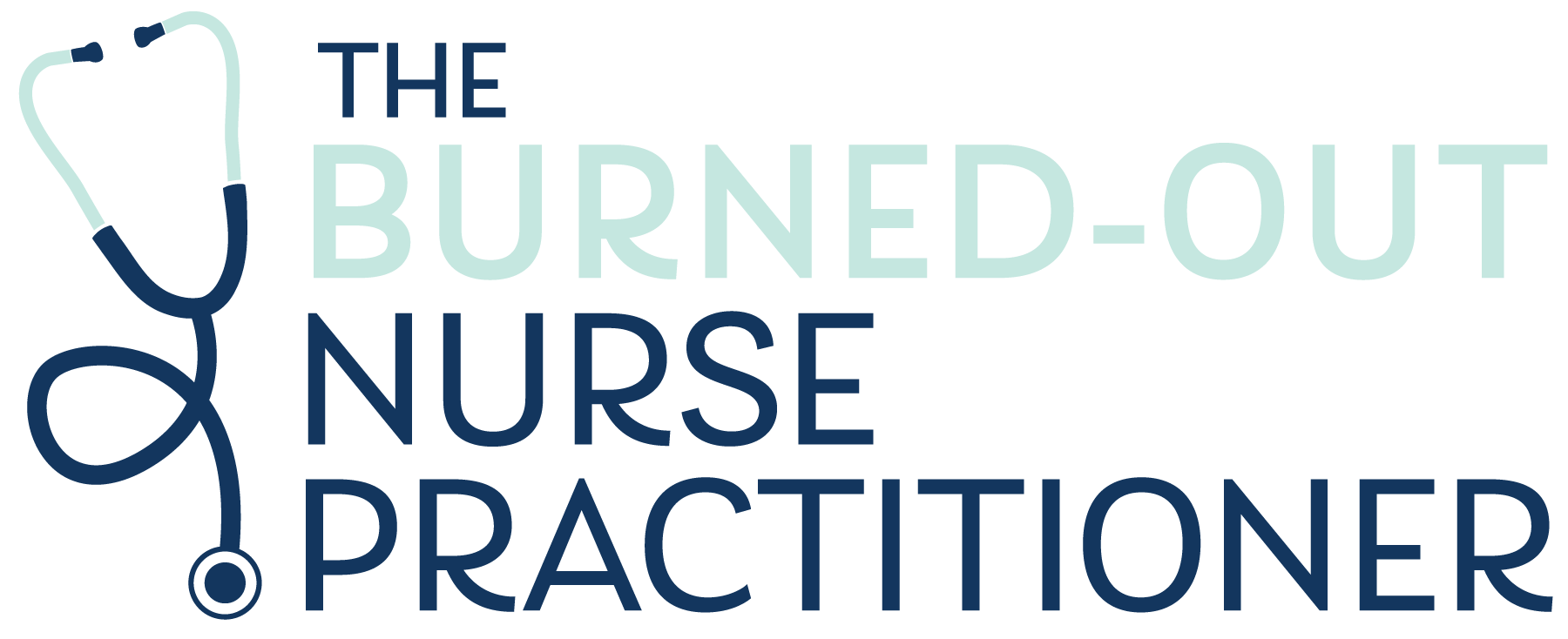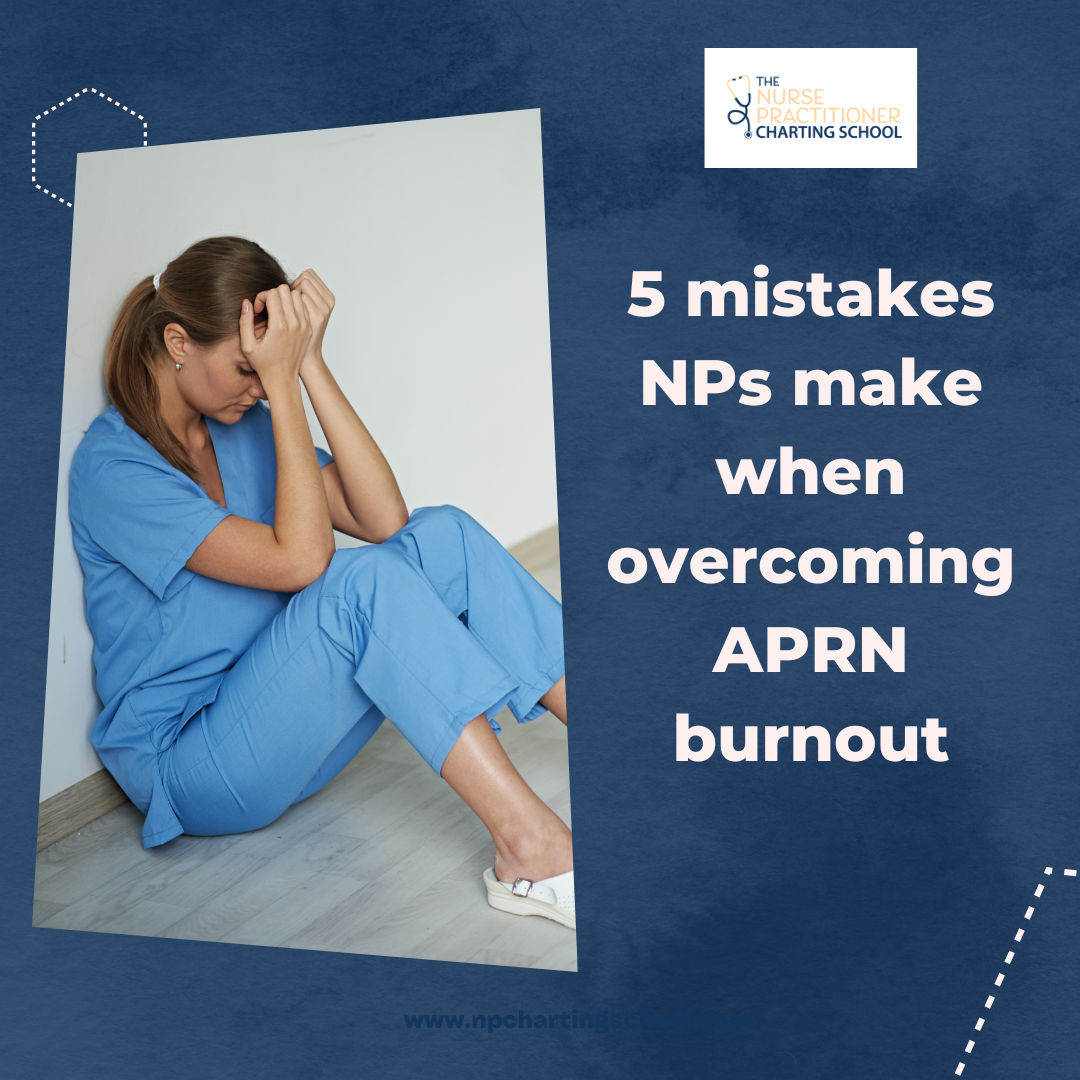As The Burned-out Nurse Practitioner, I assist nurse practitioners with creating a better work-life balance and overcoming APRN burnout. So many nurse practitioners are spending more time at work and less time at home. So many are mentally, physically, emotional exhausted. So many feel detached from their work and their personal lives. So many are burned-out and ready to leave healthcare.
Through The Burned-out NP, I have seen it possible for nurse practitioners to resolve their burnout and have actually overcome burnout myself! Trust me when I say it is possible! But there are a few mistakes that NPs can make when overcoming APRN burnout. We will take a look at a few of these mistakes and solutions for overcoming APRN burnout.
Mistakes when overcoming APRN burnout
Mistake 1: Neglecting self-care
One of the most prevalent mistakes nurse practitioners make when trying to overcome burnout is neglecting self-care. APRNs often take care of everyone BUT themselves.
Nurse Practitioners often prioritize their patients’ needs and well-being over their own, leading to exhaustion and emotional fatigue. They may skip meals, ignore exercise routines, and sacrifice sleep, which can adversely affect their mental, physical, and emotional health.
Neglecting self-care decreases nurse practitioner’s productivity and focus while at work. This decrease causes APRNs to not get as much work done and therefore stay late at the office or bring charts home to finish. This added work/time creates a lack of work-life balance which can lead to nurse practitioner burnout.
Solution: Prioritize self-care
Nurse practitioners must recognize the importance of self-care in preventing and overcoming APRN burnout. APRNs have to prioritize their time and energy to care for themselves first.
Taking regular breaks, eating nutritious meals, engaging in physical activity, and getting enough sleep are essential for maintaining physical and mental well-being. Allowing time to relax and recharge is also important. Choose activities that help fill your cup and make you happy. Setting boundaries and learning to say no when overwhelmed can also help nurse practitioners improve work-life balance.
Make it easy to get the self-care accomplished to help when overcoming APRN burnout.
Mistake 2: Setting unrealistic expectations
Nurse practitioner burnout can occur when APRNs set unrealistic expectations for themselves, aiming for perfection in every aspect of their work. The healthcare industry can be unpredictable, and despite their best efforts, APRNs cannot control every outcome.
Nurse practitioners may also set unrealistic expectations for the length of time needed when overcoming APRN burnout. Nurse practitioners may want to expedite the process to finally get their life back. There will be challenges and obstacles the APRN will have to overcome.
Solution: Set realistic goals
Nurse practitioners need to remember they did not become burned-out overnight and resolving the nurse practitioner burnout does not happen immediately. Nurse practitioners should set achievable goals and acknowledge that they are human. APRNs are going to mess up, slide back into old, unhealthy habits, and want to give up overcoming APRN burnout.
They need to understand that some situations are beyond their control, and accepting this reality can help alleviate the pressure they put on themselves. Celebrating small victories and learning from setbacks will foster a sense of accomplishment and growth, leading to a more sustainable career path.
Small, attainable changes can really add up to create a bigger impact! Remember that work and life will never be 100% balanced. But we can shift our efforts to creating a better balance between work and life.

Mistake 3: Overextending themselves
Nurse practitioners have a large number of responsibilities and tasks needed to complete during the workday. Then add on our personal responsibilities at home. APRNs work long hours, bringing charts home, and sacrifice time for our families or ourselves. This constant stress and overwhelm lead to physical, mental, emotional exhaustion which leads to nurse practitioner burnout.
Solution: Establish work-life balance
Maintaining a healthy work-life balance is vital in preventing nurse practitioner burnout. APRNs have very mentally, emotionally, and physically demanding jobs. We spend a lot of time (approximately 10-15 extra hours a week) just trying to catch up with our chart notes and other tasks.
While there are solutions (such as The Comprehensive List of Smart Phrases or The Time Management and Charting Tips Course), nurse practitioners should take the necessary steps to lighten their workload at home. What kind of tasks can be outsourced? Can you have a house cleaner come in once a week so you don’t have to spend your off time cleaning?
Nurse practitioners should assess their workload and make necessary adjustments to ensure they have enough time for relaxation, hobbies, and spending time with loved ones. Engaging in activities that bring joy and fulfillment outside of work can serve as a buffer against the stressors of their profession.
Mistake 4: Ignoring signs and symptoms of burnout
Despite the increasing prevalence of burnout in healthcare, many nurse practitioners may dismiss the early signs of burnout, attributing their feelings of exhaustion and frustration to temporary stressors. I was the same way.
When I became burned-out, I didn’t even know it. I was mentally, physically, and emotionally exhausted. I dreaded going to work each day. I wasn’t showing up for my patients, my family, or myself. I lacked empathy, compassion, and felt detached from my work. It wasn’t until I read an article about compassion fatigue that I figured out I was truly burned-out.
Solution: Recognize and address nurse practitioner burnout
It is crucial for nurse practitioners to be aware of the signs and symptoms of nurse practitioner burnout and take them seriously. Common signs include mental/emotional/physical exhaustion, irritability, reduced empathy, a detachment from work or self, and a decline in job satisfaction.
Recognizing these signs early on allows nurse practitioners to seek help and implement coping strategies to prevent burnout from escalating. Then addressing the burnout by investing in resources such as Burnout Resolution for Nurse Practitioners.
Mistake 5: Isolating themselves
Nurse practitioner burnout can lead to social withdrawal, as NPs may feel disconnected from their colleagues or feel like a burden by sharing their struggles. It is easy for nurse practitioners to feel like they are the only ones facing burnout. Especially if the APRN has personal obligations at home to manage.
As The Burned-out Nurse Practitioner, I have seen so many APRNs struggle with burnout and lack of work-life balance. We were burned-out before the COVID-19 pandemic, but the past three years have been incredibly difficult. So many nurse practitioners are struggling and I have made it my mission to help these overwhelmed NPs create a better work-life balance and overcome nurse practitioner burnout!
Solution: Seek support
To overcome burnout, nurse practitioners should actively seek support. This may include talking to colleagues, mentors, or supervisors about their experiences and challenges. Joining The Burned-out Nurse Practitioner Facebook Group or professional organizations can also offer a safe space to share feelings and experiences with like-minded individuals who understand the struggles of the profession.
Nurse practitioners should foster open communication with their colleagues and supervisors, encouraging a culture where team members can express their concerns without judgment. Engaging in team-building activities and showing appreciation for each other’s contributions can strengthen the sense of camaraderie and support.
Additional resources for overcoming APRN burnout
Overcoming nurse practitioner burnout is a journey that requires self-awareness, resilience, and the willingness to make positive changes. Nurse practitioners are essential pillars of the healthcare system, and their well-being directly impacts patient care.
By avoiding common mistakes while overcoming nurse practitioner burnout, APRNs can find balance and fulfillment in their profession. Emphasizing self-care, seeking support, and fostering a positive work environment are crucial steps in preventing and overcoming nurse practitioner burnout.
If you need additional support when overcoming APRN burnout, check out The Burned-out Nurse Practitioner.
- Burnout Resolution for Nurse Practitioners teaches NPs the framework and mindset shifts to empower you create a better work-life balance and resolve the burnout.
- Coaching Session with a Burnout Resolution Coach gives NPs personalized support on topics ranging from overcoming nurse practitioner burnout to determining if you should quit the J.O.B. that is burning you out, to everything in between.
- The Burned-out Nurse Practitioner’s blog page offers tips and tricks for creating a better work-life balance and overcoming nurse practitioner burnout.
- The Nurse Practitioner Charting School is the one-stop for all documentation resources created specifically for nurse practitioners.
Don’t forget to join The Burned-out Nurse Practitioner’s Facebook Group. The group is full of equally burned-out nurse practitioners ready to support one another!

For time management and charting tips, check out The Nurse Practitioner Charting School– The one stop for all documentation resources created specifically for nurse practitioners. Learn more at www.npchartingschool.com

**Full disclosure, this blog post may include affiliate links. I do receive a commission if any of the affiliate programs/services/supplies are purchased. This is at no extra cost to you but does allow me to continue to provide content as The Burned-out Nurse Practitioner! Thank you!




